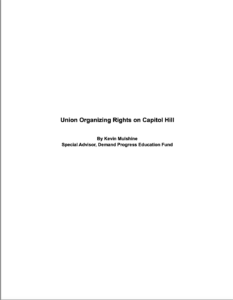Report Authored by Kevin Mulshine, former Senior Advisor and Counsel on the first staff of the Office of Compliance/Office of Congressional Workplace Rights
Demand Progress Education Fund released today Union Organizing Rights on Capitol Hill to equip staff in the US House of Representatives with guidance on how they can implement newly won rights to collectively bargain. Written by former counsel from the Congressional office responsible for implementing House union rules, this primer covers topics including how House staffers can select a union representative, the value of collective bargaining in House offices, and what a contract might guarantee. Author Kevin Mulshine also discussed Congressional union rights at a Demand Progress virtual briefing the week the unionization rules went into effect.
“Now that staff in the House of Representatives have won the right to unionize, they need non-partisan, factual information that describes what they can negotiate for under a collective bargaining agreement in order to create a smoothly-functioning workplace,” said Daniel Schuman, policy director at Demand Progress Education Fund. “Along with recent reforms to improve the Congressional workplace and redress longstanding deficiencies, the ability for staff to negotiate for fair working conditions will allow the Legislative branch to continue to make course corrections to meet the needs of employers and employees, thereby sustaining Congress’s ability to recruit and retain diverse public servants dedicated to working on behalf of the American people for years to come.”
Daniel Schuman, policy director at Demand Progress Education Fund
The Union Organizing Rights on Capitol Hill report explains:
- What a bargaining agent is and the benefits of a collective bargaining agreement
- What is and is not bargainable (i.e., what terms of employment are established by law)
- How a union may bargain over all aspects of compensation (including COLAs) and address issues of pay and overtime
- How a union may negotiate over
- performance appraisals
- student loan repayment benefits
- parental leave
- limitations on required overtime work
- How employing offices may not make unilateral changes in terms and conditions of employment without notice and bargaining once a union is certified
- The role of the Office of Congressional Workplace Rights
Since unionization rules by the Office of Congressional Workplace Rights went into effect July 18, eight offices in the House have announced they would form unions, and we expect the numbers to increase in the coming months. At the same time, staff expressed confusion about what issues were off limits to negotiation, showing a real need for the guidance Union Organizing Rights on Capitol Hill provides.
House political and non-political staff earned the right to select a union to represent them in the workplace after the House voted in favor of H.Res.1096, a resolution introduced by Rep. Andy Levin to extend unionization rights granted by the Congressional Accountability Act of 1995 to House staff. Most staffers enjoying these new rights are in political positions, but a good number are in House support offices like the Clerk, the Sergeant at Arms, the Chief Administrative Officer, and other House support offices.
The struggle to secure fair working conditions for Hill staffers is far from over. Staff in the Senate do not have unionization rights, which means Senate staff have little recourse to address the pay disparity recently revealed that shows both parties pay their non-white Senate staffers thousands of dollars less per year, There’s also still the need to legislatively authorize shared staff (like at CBO and OCWR) the right to unionize.
Demand Progress Education Fund is a 501(c)3 charitable organization that educates the public on the impacts of concentrated power over our economy and democracy. Its First Branch Forecast weekly newsletter breaks news on congressional workplace developments.

